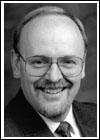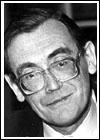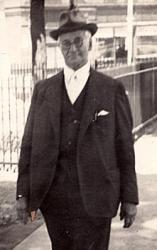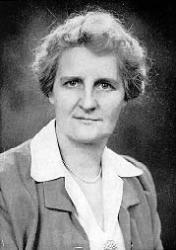Planning worship?
Check out our sister site, ZeteoSearch.org,
for 20+ additional resources related to your search.
- |
User Links
Person Results
Jack Schrader

b. 1942 Person Name: Jack Schrader, b. 1942 Topics: Daily Prayer Evening; Discipleship; God as Guide; God's Presence; God's Reign; God As Ruler; God's Wisdom; Jesus Christ King; Jesus Christ Light; New Heaven and Earth; Hymns That Are Prayer; Surrender Arranger of "SLANE" in Lift Up Your Hearts JACK SCHRADER (b. 1942), arranger, composer, conductor, vocalist, and organist/pianist, is past editor with Hope Publishing Company, retiring in January of 2009. His association with Hope began in 1978. A 1964 graduate of Moody Bible Institute of Chicago, where he majored in Voice and Organ, he also received the Bachelor of Music Education degree from the University of Nebraska (1966). Further studies in theology culminated in Jack's ordination by the Evangelical Free Church of America (1975). Born in St. Louis, Missouri, he now resides in Wheaton, Illinois, with his wife, Karen. They have three children, Beth, Jonathan and Joel, and currently three grandchildren.
Jack is the best selling choral composer in the Hope catalog. In addition to choral music Jack has published collections for keyboardists, instrumentalists and vocal soloists. He was a member of the editorial committee for Hope's most recent hymnal, WORSHIP & REJOICE (2001), in which he has 24 hymn credits. His music is heard in hundreds of churches across the country each Sunday, and he can be seen throughout the year as a guest clinician at choral reading sessions and workshops.
--www.hopepublishing.com
Jack Schrader
Thomas Olivers

1725 - 1799 Person Name: Oliver Topics: Devout Exercise; God the Pilgrim's Guide and Strength Author of "Guide me, O thou great Jehovah" in Hymns for Christian Devotion Thomas Olivers was born in Tregonan, Montgomeryshire, in 1725. His youth was one of profligacy, but under the ministry of Whitefield, he was led to a change of life. He was for a time apprenticed to a shoemaker, and followed his trade in several places. In 1763, John Wesley engaged him as an assistant; and for twenty-five years he performed the duties of an itinerant ministry. During the latter portion of his life he was dependent on a pension granted him by the Wesleyan Conference. He died in 1799.
--Annotations of the Hymnal, Charles Hutchins, M.A., 1872.
==================
Olivers, Thomas, was born at Tregynon, near Newtown, Montgomeryshire, in 1725. His father's death, when the son was only four years of age, followed by that of the mother shortly afterwards, caused him to be passed on to the care of one relative after another, by whom he was brought up in a somewhat careless manner, and with little education. He was apprenticed to a shoemaker. His youth was one of great ungodliness, through which at the age of 18 he was compelled to leave his native place. He journeyed to Shrewsbury, Wrexham, and Bristol, miserably poor and very wretched. At Bristol he heard G. Whitefield preach from the text "Is not this a brand plucked out of the fire?" That sermon turned the whole current of his life, and he became a decided Christian. His intention at the first was to join the followers of Whitefield, but being discouraged from doing so by one of Whitefield's preachers, he subsequently joined the Methodist Society at Bradford-on-Avon. At that town, where he purposed carrying on his business of shoemaking, he met John Wesley, who, recognising in him both ability and zeal, engaged him as one of his preachers. Olivers joined Wesley at once, and proceeded as an evangelist to Cornwall. This was on Oct. 1, 1753. He continued his work till his death, which took place suddenly in London, in March 1799. He was buried in Wesley's tomb in the City Road Chapel burying ground, London. Olivers was for some time co-editor with J. Wesley of the Arminian Magazine, but his lack of education unfitted him for the work. As the author of the tune Helmsley, and of the hymn “The God of Abraham praise," he is widely known. He also wrote “Come Immortal King of glory;" and "O Thou God of my salvation," whilst residing at Chester; and an Elegy on the death of John Wesley. His hymns and the Elegy were reprinted (with a Memoir by the Rev. J. Kirk) by D. Sedgwick, in 1868.
--John Julian, Dictionary of Hymnology (1907)
Thomas Olivers
Timothy Dudley-Smith
1926 - 2024 Topics: Jesus Christ Guide; Jesus Christ Teacher; Encouragement; Jesus Christ Guide; Jesus Christ Presence of; Jesus Christ Teacher; Jesus Christ Final Victory; Praise of Jesus Christ; Security Author of "Christ Be My Leader" in The Worshiping Church Timothy Dudley-Smith (b. 1926) Educated at Pembroke College and Ridley Hall, Cambridge, Dudley-Smith has served the Church of England since his ordination in 1950. He has occupied a number of church positions, including parish priest in the diocese of Southwark (1953-1962), archdeacon of Norwich (1973-1981), and bishop of Thetford, Norfolk, from 1981 until his retirement in 1992. He also edited a Christian magazine, Crusade, which was founded after Billy Graham's 1955 London crusade. Dudley-Smith began writing comic verse while a student at Cambridge; he did not begin to write hymns until the 1960s. Many of his several hundred hymn texts have been collected in Lift Every Heart: Collected Hymns 1961-1983 (1984), Songs of Deliverance: Thirty-six New Hymns (1988), and A Voice of Singing (1993). The writer of Christian Literature and the Church (1963), Someone Who Beckons (1978), and Praying with the English Hymn Writers (1989), Dudley-Smith has also served on various editorial committees, including the committee that published Psalm Praise (1973).
Bert Polman
Timothy Dudley-Smith
Martin Luther

1483 - 1546 Person Name: Luther or Walthers Topics: The Church Year Pentecost; The Church Year Pentecost; Beginning of Service; Holy Ghost Our Guide Adapter of "[Gracious Spirit, Dove divine!]" in The Lutheran Hymnary Luther, Martin, born at Eisleben, Nov. 10, 1483; entered the University of Erfurt, 1501 (B.A. 1502, M.A.. 1503); became an Augustinian monk, 1505; ordained priest, 1507; appointed Professor at the University of Wittenberg, 1508, and in 1512 D.D.; published his 95 Theses, 1517; and burnt the Papal Bull which had condemned them, 1520; attended the Diet of Worms, 1521; translated the Bible into German, 1521-34; and died at Eisleben, Feb. 18, 1546. The details of his life and of his work as a reformer are accessible to English readers in a great variety of forms. Luther had a huge influence on German hymnody.
i. Hymn Books.
1. Ellich cristlich lider Lobgesang un Psalm. Wittenberg, 1524. [Hamburg Library.] This contains 8 German hymns, of which 4 are by Luther.
2. Eyn Enchiridion oder Handbuchlein. Erfurt, 1524 [Goslar Library], with 25 German hymns, of which 18 are by Luther.
3. Geystliche Gesangk Buchleyn. Wittenberg, 1524 [Munich Library], with 32 German hymns, of which 24 are by Luther.
4. Geistliche Lieder auffs new gebessert. Wittenberg. J. Klug, 1529. No copy of this book is now known, but there was one in 1788 in the possession of G. E. Waldau, pastor at Nürnberg, and from his description it is evident that the first part of the Rostock Gesang-Buch, 1531, is a reprint of it. The Rostock Gesang-Buch, 1531, was reprinted by C. M. Wiechmann-Kadow at Schwerin in 1858. The 1529 evidently contained 50 German hymns, of which 29 (including the Litany) were by Luther.
5. Geistliche Lieder auffs new gebessert. Erfurt. A. Rauscher, 1531 [Helmstädt, now Wolfenbüttel Library], a reprint of No. 4.
6. Geistliche Lieder. Wittenberg. J. Klug, 1535 [Munich Library. Titlepage lost], with 52 German hymns, of which 29 are by Luther.
7. Geistliche Lieder auffs new gebessert. Leipzig. V. Schumann, 1539 [Wernigerode Library], with 68 German hymns, of which 29 are by Luther.
8. Geistliche Lieder. Wittenberg. J. Klug, 1543 [Hamburg Library], with 61 German hymns, of which 35 are by Luther.
9. Geystliche Lieder. Leipzig. V. Babst, 1545 [Gottingen Library]. This contains Luther's finally revised text, but adds no new hymns by himself. In pt. i. are 61 German hymns, in pt. ii. 40, of which 35 in all are by Luther.
For these books Luther wrote three prefaces, first published respectively in Nos. 3, 4, 9. A fourth is found in his Christliche Geseng, Lateinisch und Deudsch, zum Begrebnis, Wittenberg, J. Klug, 1542. These four prefaces are reprinted in Wackernagel’s Bibliographie, 1855, pp. 543-583, and in the various editions of Luther's Hymns. Among modern editions of Luther's Geistliche Lieder may be mentioned the following:—
Carl von Winterfeld, 1840; Dr. C. E. P. Wackernagel, 1848; Q. C. H. Stip, 1854; Wilhelm Schircks, 1854; Dr. Danneil, 1883; Dr. Karl Gerok, 1883; Dr. A. F. W. Fischer, 1883; A. Frommel, 1883; Karl Goedeke, 1883, &c. In The Hymns of Martin Luther. Set to their original melodies. With an English version. New York, 1883, ed. by Dr. Leonard Woolsey Bacon and Nathan H. Allen, there are the four prefaces, and English versions of all Luther's hymns, principally taken more or less altered, from the versions by A. T. Russell, R. Massie and Miss Winkworth [repub. in London, 1884]. Complete translations of Luther's hymns have been published by Dr. John Anderson, 1846 (2nd ed. 1847), Dr. John Hunt, 1853, Richard Massie, 1854, and Dr. G. Macdonald in the Sunday Magazine, 1867, and his Exotics, 1876. The other versions are given in detail in the notes on the individual hymns.
ii. Classified List of Luther's Hymns. Of Luther's hymns no classification can be quite perfect, e.g. No. 3 (see below) takes hardly anything from the Latin, and No. 18 hardly anything from the Psalm. No. 29 is partly based on earlier hymns (see p. 225, i.). No. 30 is partly based on St. Mark i. 9-11, and xvi., 15, 16 (see p. 226, ii.). No. 35 is partly based on St. Luke ii. 10-16. The following arrangement, however, will answer all practical purposes.
A. Translations from the Latin.
i. From Latin Hymns:
1. Christum wir sollen loben schon. A solis ortus cardine
2. Der du bist drei in Einigkeit. O Lux beata Trinitas.
3. Jesus Christus unser Heiland, Der von. Jesus Christus nostra salus
4. Komm Gott Schopfer, heiliger Geist. Veni Creator Spiritus, Mentes.
5. Nun komm der Beidenheiland. Veni Redemptor gentium
6. Was flirchst du Feind Herodes sehr. A solis ortus cardine
ii. From Latin Antiphons, &c.:
7. Herr Gott dich loben wir. Te Deum laudamus.
8. Verleih uns Frieden gnädiglich. Dapacem, Domine
9. Wir glauben all an einen Gott.
iii. Partly from the Latin, the translated stanzas being adopted from Pre-Reformation Versions:
10. Komm, heiliger Geist, Herre Gott.
11. Mitten wir im Leben sind. Media vita in morte sumus.
B. Hymns revised and enlarged from Pre-Reformation popular hymns.
12. Gelobet seist du Jesus Christ.
13. Gott der Vater wohn uns bei.
14. Gott sei gelobet und gebenedeiet.
15. Nun bitten wir den heiligen Geist.
C. Psalm versions.
16. Ach Gott vom Himmel, sieh darein.
17. Aus tiefer Noth schrei ich zu dir.
18. Ein' feste Burg ist unser Gott.
19. Es spricht der Unweisen Mund wohl.
20. Es wollt uns Gott genädig sein.
21. War Gott nicht mit uns diese Zeit.
22. Wohl dem, der in Gotten Furcht steht.
D. Paraphrases of other portions of Holy Scripture.
23. Diess sind die heilgen zehn Gebot.
24. Jesaia dem Propheten das geschah.
25. Mensch willt du leben seliglich.
26. Mit Fried und Freud ich fahr dahin.
27. Sie ist mir lieb die werthe Magd.
28. Vater unser im Himmelreich.
E. Hymns mainly Original.
29. Christ lag in Todesbanden.
30. Christ unser Herr zum Jordan kam.
31. Ein neues Lied wir heben an.
32. Erhalt uns Herr bei deinem Wort.
33. Jesus Christus unser Heiland, Der den,
34. Nun freut euch lieben Christengemein.
35. Vom Himmel hoch da komm ich her.
36. Vom Himmel kam der Engel Schaar.
In addition to these —
37. Fur alien Freuden auf Erden.
38. Kyrie eleison.
In the Blätter fur Hymnologie, 1883, Dr. Daniel arranges Luther's hymns according to what he thinks their adaptation to modern German common use as follows:—
i. Hymns which ought to be included in every good Evangelical hymn-book: Nos. 7-18, 20, 22, 28, 29, 30, 32, 34, 35, 36, 38.
ii. Hymns the reception of which into a hymn-book might be contested: Nos. 2, 3, 4, 19, 21, 22, 23, 24, 25, 33.
iii. Hymns not suited for a hymn-book: Nos. 1, 5, 6, 27, 31, 37.
[Rev. James Mearns, M.A.]
--John Julian, Dictionary of Hymnology (1907)
Martin Luther
William Harold Ferguson
1874 - 1950 Person Name: W. H. Ferguson Topics: Jesus Christ Guide and Leader; Jesus Christ Master; Jesus Christ Strength and Refuge Composer of "WOLVERCOTE" in Rejoice in the Lord Born: January 1, 1874, Leeds, England.
Died: October 18, 1950, Littlehampton, Sussex, England.
Ferguson was educated at Magdalen College School, Oxford, and was a chorister in the College chapel. After graduating from Keble College, he taught at St. Edward’s School, Oxford (1896-69) and Bilton Grange, Rugby (1899-1901). He later attended Cuddesdon Theological College. After ordination, he served as assistant master, chaplain, organist and director of chapel music at Lancing College (1902-13); Warden of St. Edward’s School, Oxford (1913-25); Warden of St Peter’s College, Radley, Abingdon, Oxfordshire (1925-37); and Canon and Precentor of Salisbury Cathedral (1937-47). With Geoffrey Shaw, he was joint music editor of The Public School Hymn Book in 1919.
--www.hymntime.com/tch/
William Harold Ferguson
D. T. Niles

1908 - 1970 Topics: Faith and Trust; Images of God, Christ and the Holy Spirit Friend and Kindred; Images of God, Christ and the Holy Spirit Guide and Leader; Images of God, Christ and the Holy Spirit Healer and Health; Images of God, Christ and the Holy Spirit Savior and Redeemer; Images of God, Christ and the Holy Spirit Shepherd; Images of God, Christ and the Holy Spirit Teacher and Counsel; Images of God, Christ and the Holy Spirit The Life, Bread, Rice and Water; Images of God, Christ and the Holy Spirit The Way, Road and Map Paraphraser (English) of "Christ Is All to Me (Yellaam Yesuvee)" in Sound the Bamboo
D. T. Niles
Colin Gibson

b. 1933 Topics: God Giver; God Guide; God God's Love Composer of "MAITLAND STREET" in New Hymns of Hope Colin Gibson (b. 1933) was born in Dunedin, the south island of New Zealand. He has been writing hymn texts and hymn settings for over 20 years. His works have been published and performed in Africa, the United States, Asia and Australasia, Great Britain and Europe. He is organist and director of the Mornington Methodist Choir, Dunedin, New Zealand, a lay preacher, and retired in 1999 as Head of the Department and Donald Collie Professor of English at the University of Otago where he currently heads the Department of Theatre Studies and continues to lecture on English Literature as Emeritus Professor. He has conducted numerous hymn workshops in New Zealand, Australia and Great Britain, and has been co-editor of a number of hymn collections. His frequent collaboration with Shirley Erena Murray is represented in several Hope publications, and he has his own published collections of hymns: Singing Love (Collins) and more recently Reading the Signature (Hope, 1994 - Code #1753) and Songs for a Rainbow People (Hope, 1998 - Code #8005). Three of his hymns are included in the Hope hymnal Worship & Rejoice (2001).
--www.hopepublishing.com
Colin Gibson
George Orlia Webster

1866 - 1942 Person Name: George O. Webster Topics: Jesus Christ Guide; Confession of Sin; Jesus Christ Example; Jesus Christ Friend; Jesus Christ Refuge Author of "I Need Jesus" in Sing Joyfully
George Orlia Webster
Michael Bruce
1746 - 1767 Person Name: Michael Bruce (1746-1767) Topics: Aspirations For Peace and Rest; Family Worship; God Guide; Pilgrims Prayer of Author of "Jacob's Vow" in Songs of Praise with Tunes Bruce, Michael, son of a Scottish weaver, was born at Kinnesswood, Portmoak, Kinrossshire, Scotland, March 27,1746, and educated at the village school, Edinburgh University (where he first became acquainted with John Logan), and the Theological Hall of the Associate Synod, held at Kinross, under the Rev. John Swanston, intending ultimately to enter the ministry, a hope which was frustrated by his untimely death. To assist in procuring University fees and maintenance he for some time conducted a school, during the recess, at Gairney Bridge, and subsequently at Forrest Mill, near Tillicoultry. Whilst yet a student he died at Kinnesswood, July 5th, 1767.
[Also, see Logan, John]
The names of Michael Bruce and John Logan are brought together because of the painful controversy which has long prevailed concerning the authorship of certain Hymns and Paraphrases of Holy Scripture which are in extensive use in the Christian Church both at home and abroad. During the latter years of Bruce's short life he wrote various Poems, and also Hymns for a singing class at Kinnesswood, which were well known to his family and neighbours, and were eventually copied out by Bruce himself in a quarto MS. book, with the hope that some day he might see them in print. Immediately upon his death, in 1767, Logan called upon his father and requested the loan of this book that he might publish the contents for the benefit of the family. This was granted. Not till three years afterwards did a certain work, containing seventeen poems, and entitled Poems on Several Occasions , by Michael Bruce, 1770, appear, with a Preface in which it was stated that some of the Poems were by others than Bruce.
-- John Julian, Dictionary of Hymnology (1907)
Michael Bruce
Avis B. Christiansen

1895 - 1985 Topics: Following God/Christ; God Guide; God Power; Heaven; Inner Peace; Serenity Author of "Come, Come, Ye Saints" in The Worshiping Church Avis Marguerite Burgeson was born in 1895 and lived in Chicago all her life. She attended the Moody Church, pastored for many years by Dr. Harry Ironside. In 1917, Avis Burgeson married Ernest Christiansen who later became a vice president of Moody Bible Institute. She was a modest and retiring woman, and sometimes used pen names: Avis Burgesson, Christian B. Anson and Constance B. Reid. She began writing poems in childhood, and before her death in 1985 had written thousands of them. She died in 1985.
NN, Hymnary
Avis B. Christiansen


 My Starred Hymns
My Starred Hymns

